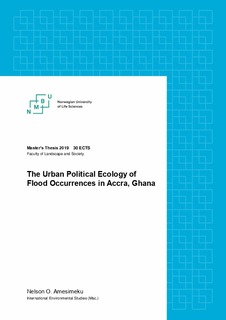| dc.description.abstract | This study explores how human-nature interactions, socio-political relations and ecological conditions create and shape natural disasters in Accra, Ghana. It aids the understanding of the impacts of floods and governmental responses to floods in the urban space of Accra. The study area consisted of few suburbs of Accra namely, Odawna, Dome, Kissieman, Kwabenya, Madina, and communities in Tema, all located in the Greater Accra region of Ghana. Employing the urban political ecology theory, this study argues that the factors causing urban floods are compound, not just climate change and nature. Thus, it looks at the power play between both government and non-government actors that create and shape floods, the consequences of floods on the poor and the types of government responses needed to reduce future vulnerabilities to disasters. The outcomes of the study revealed that after a heavy downpour which may be caused by climate change or variability, a number of factors interact with this heavy downpour to cause floods in the city. As found, the uncoordinated physical planning of the city, improper waste disposal and management, uncontrolled human settlements on flood prone zones, limited capacity of state institutions governing land use and water management, and overreliance on antiquated and poorly maintained infrastructure were among the factors creating and shaping floods. The impacts of floods in Accra, just as it is in any other places have always been loss of properties, lives and livelihoods. Flooding has resulted in the destruction of buildings and vehicles, rendering a lot of people homeless. In all these, the poorest have suffered the most due to their living in slums, low-lying and flood prone zones where government services do not reach.
In order to reduce the vulnerability to future flooding, government officials have planned to desilt water channels as well as improve on their qualities. In addition, some experts suggest that the metropolitan authorities must begin to plan and coordinate the physical expansion of the cities so that people would no longer build on flood prone zones. Apart from these, the government have established that safety tips, early warning signs and safety shelters be provided in order to help reduce the impacts of floods in the future.
Overall, the vulnerability of the urban poor was compounded by virtue of their living in slums located in flood-prone zones with uncoordinated physical planning, lack drainage systems and unbridled littering everywhere. | nb_NO |

